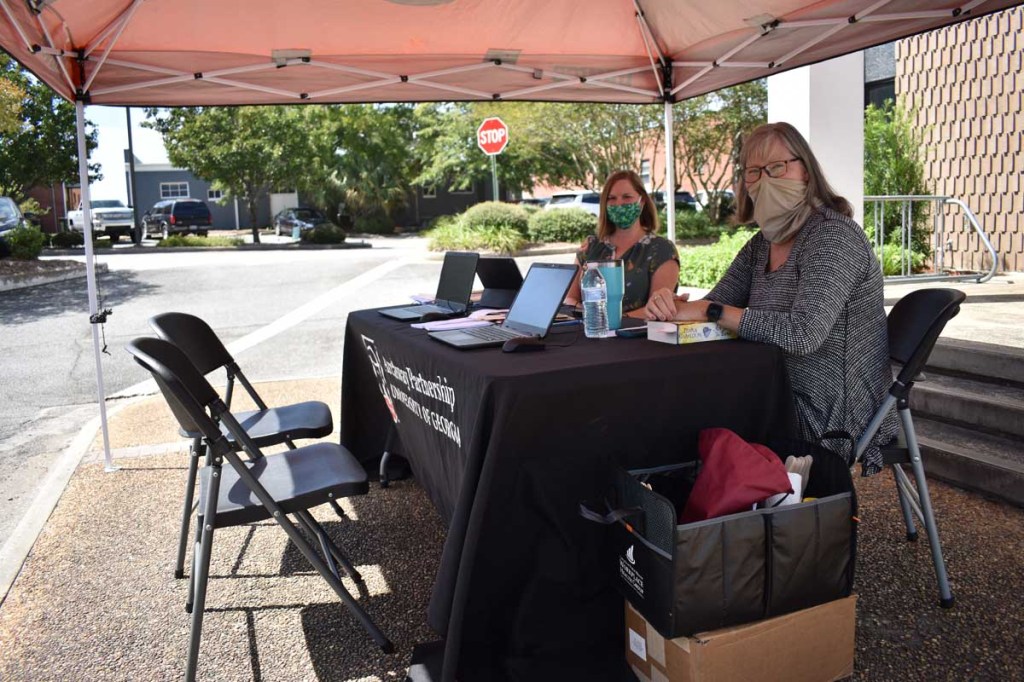Census: 10 days for 10 questions
Published 9:05 pm Tuesday, September 22, 2020

- Just as Mayor Bill McIntosh and other state officials made a vow to finish their respective censuses in ten days, census volunteers are making good on that promise. Together they sit with open computers with the census site up for any residents that haven’t filled out their forms yet.
MOULTRIE, Ga. — 10 more days for 10 questions. This is what City of Moultrie Mayor Bill McIntosh, the Georgia Municipal Association and three other Georgia city officials agreed upon Monday.
The officials — who in addition to McIntosh included Mayor Deana Ingraham of East Point, Rome City Commissioner Wendy Davis and Mayor Van Johnson of Savannah along with Larry Hanson of the GMA — made that promise in an online meeting regarding the 2020 Census.
Meeting the Census’s Sept. 30 deadline is in limbo at this point, however. With a “big fear” of an undercount, Ingraham said we only get one time to do this right.
Johnson responded in kind saying, “You play to win. Go like there is no finish line.” He spoke on the consequences of not getting an accurate count.
“We don’t say it, but the Census is how cities compare to each other,” he said. “When you’re looking at apples to apples — I look and I know everybody else looks — let’s look and see how they’re doing.”
The Census shows pros and cons of the city or rather what works and what doesn’t work almost like a scorecard, he said.
When an undercount occurs, like it did in 2010 for Savannah with those who rented homes and with minorities, you face issues in getting economic help like Savannah did with the CARES Act.
“The fact of the matter was, they used census numbers to determine who got what,” he said. “Our [Community Development Block Grants] depends on our census data.”
The CARES Act stated that it would directly dole money to units of local government if they had more than 500,000 people in it. However, no local governments in Georgia nor South Carolina had that many, according to the 2010 census.
Even Atlanta’s numbers, which were around 498,000, were projected in order to get the city over the 500K hump.
“We have more people in our cities than we can actually count and this is our one chance we can be able to do that,” Johnson said. “This is trillions of dollars in federal funding for the states, this is support from programs such as Medicaid and a special supplement to the nutrition program of WIC.”
McIntosh spoke of what issues he feels Moultrie — and by extension, Colquitt County — may face in attempting to finish the census in ten days.
Since the census is normally done every ten years, McIntosh himself has found it not to be a priority in the minds of citizens given its lack of prominence.
He said, “It’s almost like you have to invent the wheel again every ten years.”
“That’s why it’s so important that those involved get involved,” McIntosh said. “And we have to do a significant job to impress on our citizens the purpose and significance of the census process.”
And don’t forget the necessity of getting all citizens to participate, he emphasized. A lack in doing so has not only negative after effects but consequences upfront too.
McIntosh said census unfamiliarity, which leads to misconceptions, are barriers in rural areas. He’s seen it happen and heard those misconceptions from citizens. The census can be scary to them.
“There’s a belief that the census may be used to locate people living in the area without documentation [leading to] i.e. immigration issues, data privacy and confidentiality,” he said. “Racial and ethnic minorities are sensitive about confidentiality — all of us are.”
The fear that answering the census will lead to repercussions is big.
McIntosh said the city and volunteers plan to rectify that by assuring them that all information is private information that won’t be used to hurt anyone.
At the end of the day, it boils down to understanding one another. Within the rural area of Moultrie you find language barriers, distrust of government and a lack of understanding in how the census affects people personally.
“We need to impress and impact how we understand the system works in our individual communities, the local benefits we receive, [and] the better future we receive because of the census,” McIntosh said.
Types of households can be a barrier too. These include vacant households; multi-family households; renter units; households with multiple unrelated people; non-husband wife households; and households without telephone service (or internet too in some cases).
These make it difficult for census volunteers to go in and, but the other “big bear in the room, McIntosh called it, is COVID-19.
“We had several census volunteers or people sign up to take the census and because of COVID a lot of them have not shown up,” he said. “People are just reluctant to interact. They wouldn’t get out of their households and they have withdrawn because of health concerns.”
But barriers can and will be overcome as Moultrie and the rest of Georgia attempt to finish a personal state deadline: 10 more days for 10 questions. The clock is ticking.



